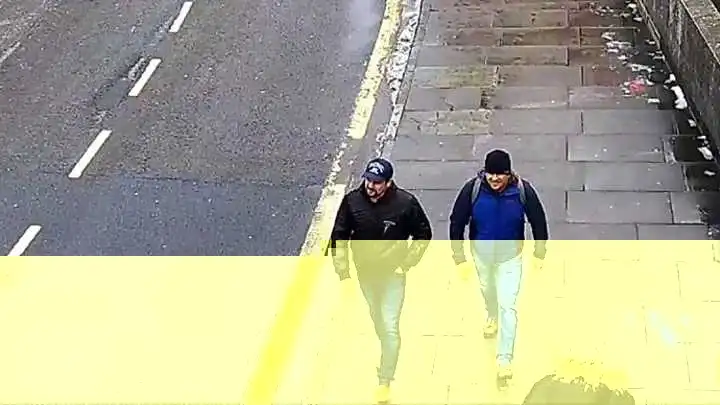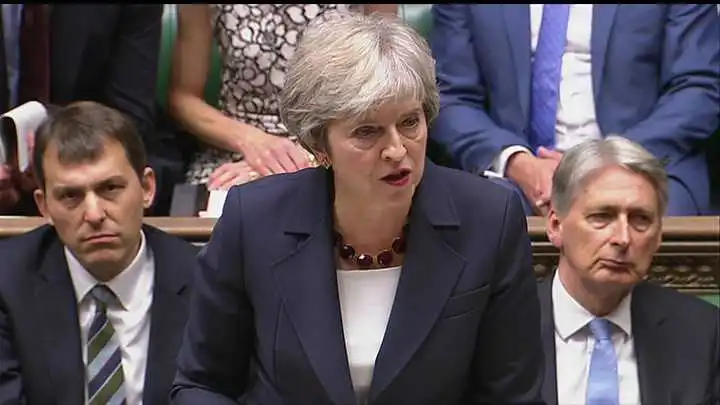
On the Novichok suspects' trail
Vladimir Putin must take responsibility for the Salisbury Novichok attack, Security Minister Ben Wallace has said.
Speaking on BBC Radio 4's Today programme, Mr Wallace stated that "ultimately, of course" the Russian president was behind the poisoning.
Ex-Russian spy Sergei Skripal, 66, and his daughter Yulia, 33, were poisoned with Novichok on 4 March.
UK officials will on Thursday brief the UN Security Council on two men suspected of carrying out the attack.
Prosecutors say there is evidence to charge the pair, who the prime minister said are thought to be officers from Russia's military intelligence service the GRU.
Mr Wallace said Mr Putin's government "controls, funds and directs the military intelligencethat's the GRU", adding that nobody could say the Russian leader was "not in control of his state".
Moscow denies any involvement in the attack.
Theresa May told the Commons on Wednesday that the suspects had entered the UK on Russian passports using the names Alexander Petrov and Ruslan Boshirov.
She said the poisoning was "not a rogue operation" and was "almost certainly" approved at a senior level of the Russian state.
Det Sgt Nick Bailey also fell ill after responding to the incident in Salisbury.
And police have linked the attack to a separate Novichok poisoning on 30 June, which led to the death of Dawn Sturgess.
Britain called Thursday's meeting of the UN Security Council a day after Mrs May addressed MPs about the suspects.
Russia is a permanent member of the council and will be represented alongside UK allies the United States and France.
Mr Wallace said the UK must use the meeting to "maintain the pressure, to say the behaviour we have seen is totally unacceptable".
And BBC security correspondent Gordon Corera stated that alongside the meeting, it was thought there would be less visible activity including covert work by British intelligence to disrupt the GRU.
Mrs May has also said Britain will push for the EU to agree new sanctions against Russia.
Ahead of the UN meeting, Australia said it was "in lock step with the UK on the importance of holding Russia to account" over the "dangerous and deliberate act".
Mr Putin's foreign policy adviser Yuri Ushakov said the names of the Russian suspects "do not mean anything to me".
Reaction from Moscow
Responding to the fresh accusations, the Kremlin's media machine resorted to its usual tactic: a combination of denials and sarcasm.
"Don't laugh," said a talk-show host on state TV, delivering the latest news from London.
The foreign ministry's spokeswoman, Maria Zakharova, put in an appearance herself to accuse the UK of fabricating the Skripal case. "This whole story was created to punish Russia... to introduce sanctions," she said on Rossiya 1 TV.
"A detective story" and "an absurd political thriller" were some of the epithets used by Russian news bulletins, which also claimed that Britain's allegations were not backed up by a shred of evidence.
At the same time, they dismissed the suspects' photographs released by London as crude fakery.
"Put evidence on the table or go to hell," said one commentator on Russian state TV.
The CPS is not applying to Russia for the extradition of the two men, as Russia does not extradite its nationals.
But a European Arrest Warrant has been obtained in case the pair travel to the EU.

Theresa May gave a statement at Prime Minister's Questions
What is the GRU?
Analysis by BBC security correspondent Frank Gardner
Less famous than the KGBor its successor, the FSBthe GRU plays a shadowy but important role in Moscow's strategic plans.
It is Russia's military intelligence arm, reporting directly to the defence minister. It has extensive cyber and signals operations and has been accused of hacking and online sabotage.
GRU officers are often stationed in embassies around the world and many were expelled after the Salisbury attack in March.
Since 2013 Russia's elite Spetznaz (Special Purpose) Special Forces have been part of the GRU's command structure and are believed to have played a part in the annexation of Crimea in 2014. British government officials maintain that the GRU's operations include assassinations both inside Russia and overseas.
Sergei Skripal served in the GRU as a military intelligence officer in Afghanistan in the 1980s. In 2006 he was arrested and jailed after reportedly betraying the names of his GRU colleagues to Britain's MI6. In 2010 he was allowed to leave for Britain as part of a prisoner swap, but in the Kremlin's eyes he will always be seen as a traitor.
The Metropolitan Police said the two men arrived at Gatwick Airport from Moscow on 2 March and stayed at the City Stay Hotel in Bow Road, east London.
On 4 March they travelled to Salisburyhaving also visited for reconnaissance the previous daywhere Mr Skripal's front door was contaminated with Novichok.
Yulia and Sergei Skripal fell ill after Mr Skripal's front door was sprayed with Novichok
Officers believe a modified perfume bottle was used to spray the door.
The pair flew from Heathrow to Moscow later that night.
While traces of Novichok were found in the London hotel room, there is no risk to other guests who were staying at the hotel at the time, police said.
They now want to hear from anyone who was a guest there from 4 March to 4 May.
Police said Ms Sturgess and her partner Charlie Rowley were later exposed to Novichok in Amesbury, near Salisbury, after handling a contaminated container, labelled as Nina Ricci Premier Jour perfume.
Mr Rowley told police he found the box containing the small bottle and an applicatorall found to be counterfeitin a charity bin.
He tried to put the two parts together and got some of the contents on himself. His partner Ms Sturgess applied some of the contents to her wrists and became unwell.
The bottle, with a modified nozzle, had contained a "significant amount" of Novichok, Scotland Yard said.
The Crown Prosecution Service says Petrov and Boshirov should be charged with offences including conspiracy to murder; attempted murder and the use and possession of Novichok contrary to the Chemical Weapons Act.
The offences only relate to the Salisbury attack. Police said officers are continuing to work with the Crown Prosecution Service on the Amesbury incident.